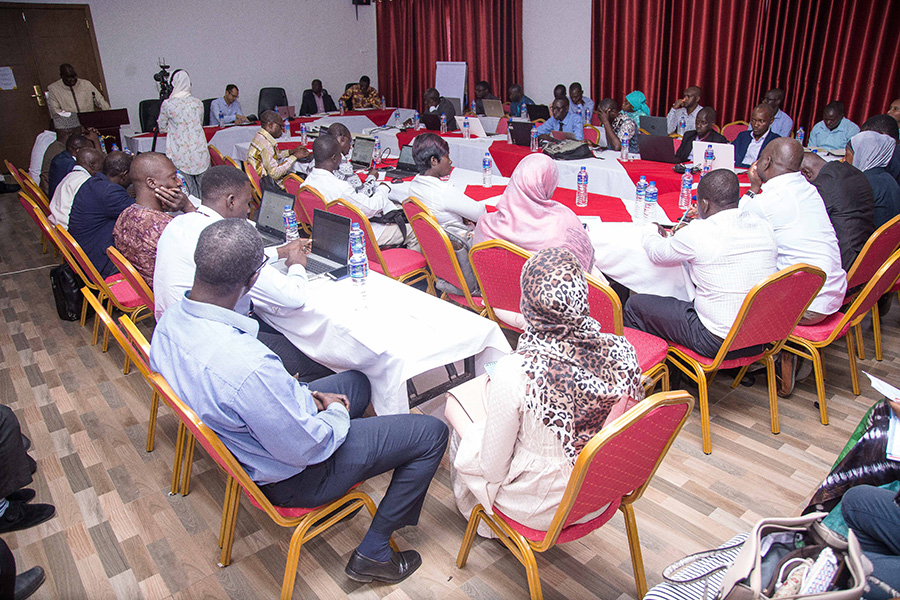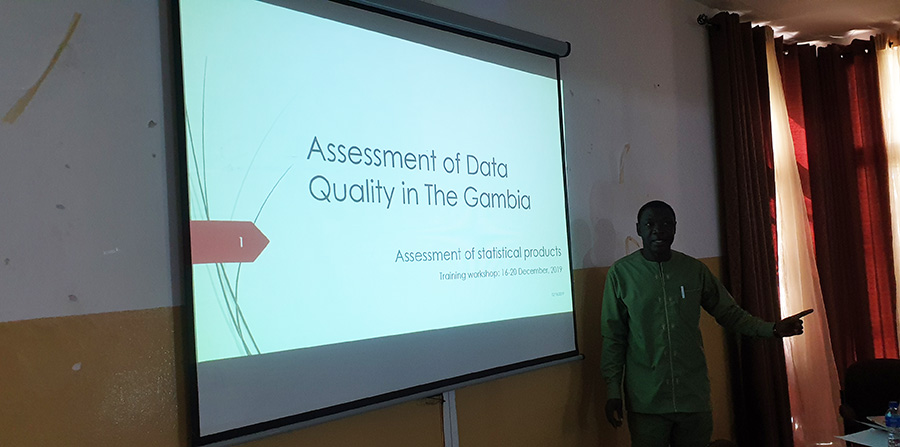DEVELOPMENTS
How Statistics Can Transform Governance: A Q&A with Economist and Statistician Jean-Paul Zoyem
Apr 20, 2020
Statistics are of paramount importance for governance. High-quality data inform policy making and the public debate: They help assess and design policies and hold governments accountable. However, as the World Bank reported in 2017, Africa’s statistical capacity lags behind most of the developed world. Absent adequate statistics, policy makers are hard pressed to conduct proper monitoring of poverty, inequality, or service delivery, to take just a few examples. Even though money has been invested to build African capacity in this regard, the political incentives needed to build and sustain reliable, independent national statistics systems are too often lacking. This shortcoming is all the more apparent under authoritarian regimes.
The Gambia is a good example of these dynamics. Governed by a dictatorship since 1994, the country embarked on a fragile democratization process after former strongman Yahya Jammeh lost the 2016 presidential election. Parliamentary elections followed in March 2017, providing the new government of President Adama Barrow with an absolute majority and a clear mandate for reform. Against high hopes for change, the economy and state structures remained highly fragile: the new government inherited weak capacities in revenue mobilization, poor public services, general mistrust of the population against the state in general, and the armed forces in particular. The government committed to reform, accountability and improved public service delivery, but the risks for the democratization process were high. The European Union stepped in with a budget support program aimed at fiscal stabilization, economic growth, and inclusive and accountable governance.
DAI has 50 years of experience in building effective and accountable governance, and has been working with The Gambia since September 2018 through the State Building Contract 1 Complementary Support project, managing capacity building and policy advice in four key areas: public finance management and procurement, security sector reform, statistical data management, and business environment and private sector development.
 To dig deeper into how and where statistical data has helped transform governance in The Gambia, we sat with Jean-Paul Zoyem, our expert on this project. Zoyem has 25 years of experience analyzing inequalities, poverty, and social protection; designing economic policy and statistical surveys; and providing technical assistance in statistics management.
To dig deeper into how and where statistical data has helped transform governance in The Gambia, we sat with Jean-Paul Zoyem, our expert on this project. Zoyem has 25 years of experience analyzing inequalities, poverty, and social protection; designing economic policy and statistical surveys; and providing technical assistance in statistics management.
Can you describe what the statistics system was like in The Gambia during the Jammeh era—and the challenges of today?
“The system was very poor. Though we have a long way to go to improve it, new and younger staff seem to be far more competent and effective than the older generation. The major gaps in official statistics are being reduced, and the quality is improving.”

Supporting the new generation of statistics professional in The Gambia. Photo courtesy: Jean-Paul Zoyem.
You are the technical lead in one of our key components, statistical data management. Tell us what you do, and with which stakeholders you work.
“In 2017, The Gambia Bureau of Statistics elaborated the second National Strategy for the Development of Statistics for 2018 to 2022. The strategy identified the strengths and weaknesses of the National Statistical System. This system includes the Bureau of Statistics, line ministries, and other stakeholders. Among the identified weaknesses were staff capacities and preparation for some statistical work, the legal framework for statistical production, poor communication among stakeholders, and processes of official statistics production.
“As technical assistant, I contribute to the capacity building of the staff through regular coaching on data collection and management and developing training programs on statistics methods and techniques. I advise on a new Statistics Act to improve the legal environment of statistics. I also organize technical workshops to reinforce the dialogue among stakeholders. Some of these activities include training statistics users and the dissemination of the main statistics products. By users I mean the media, civil society, private sector, political leaders, etc. I work closely with Bureau of Statistics to reach and give statistical support to line ministries and any other institution involved in producing official statistics. I was very happy to see how our support led to a stronger relationship between the Bureau of Statistics and the Ministry of Agriculture, for example. The Bureau of Statistics is currently supporting the ministry in the design and processing of agriculture surveys.”
By the numbers: So far, the team has trained 61 members of Parliament, 16 provincial governors and chairmen, and 90 media professionals and local CSOs on the use of official statistics. Technical training and coaching has been provided to the Gambia Bureau of Statistics and line ministries on Consumer Price Index, statistics software, sampling techniques, and the Data Quality Assessment Framework.
Building capacity is sometimes not enough to effect real change: the underlying political will and incentives may still make the difference for high-quality statistics to be recognized and used for making policy, improving accountability, and informing public debates. How do you see our work in this regard? Are policy makers, the media, and the public involved in what we do? What is their response?
“Of course, quality statistics are useless if no one uses them. As mentioned earlier, I support the Bureau in organizing trainings for statistics users including media professionals, politicians, businesses, and civil society organizations. The trainings engage these users in the policy dialogue by teaching them how to understand and use statistics and indicators. Reliable statistics systems require sustained and predictable public funding: raising awareness among policy-makers facilitates the inclusion of statistics in national budgets. It is crucial to assure that media have the right understanding of statistics and are able to provide the public with correct information. In our training, participants have expressed real satisfaction in understanding what some indicators they were using really meant. However, it is still too early to appreciate the impact of those activities in the media. Also, raising awareness among the public on the use and significance of statistics should be sustained beyond specific training or events.”

Building statistical capacities in The Gambia through best international standards. Photo courtesy: Jean-Paul Zoyem.
Can we draw lessons from The Gambia for similar work in other countries, targeting both capacity building and the incentives necessary to support statistical systems?
“The weaknesses highlighted in The Gambia’s statistical system can be seen in many developing countries. Since the approach used to strengthen the system in The Gambia has shown significant improvements, we believe it could work for other countries, too. In particular, capacity building of statistics system should be holistic, with the technical dimension rooted in a broader ecosystem. For instance, training policy makers in the use and importance of official statistics can lead to better funding of national statistics systems. Our project provided support to the development of the Data Quality Assessment Framework, an established framework that allows statistics producers and users to assess the data processing against best international standards and practices. Finally, we work very closely with the Bureau of Statistics so that project impact is permanent after technical assistance comes to an end.”
Gianfabrizio Ladini is a Senior Project Manager in DAI’s Brussels office.